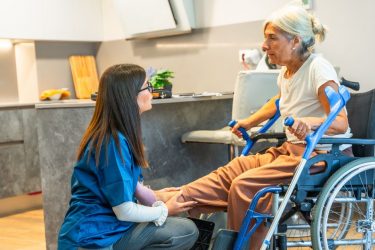Imagine being thousands of miles away from your elderly parents, wanting to ensure their well-being and happiness, but feeling utterly helpless in the face of this daunting distance. This is the reality for countless individuals navigating the complexities of long-distance caregiving. But fret not, as there are guiding tips and strategies to help you provide the best possible care for your loved ones, no matter how far apart you may be.
Long-distance caregiving presents a unique set of challenges for individuals who live far away from their aging loved ones. Balancing the responsibilities of work, family, and personal life while ensuring the well-being of a senior family member can be an overwhelming task. Understanding the intricacies of long-distance caregiving is crucial to effectively managing the care of your loved one from afar.
Section 1: Planning and Coordination from Afar
Creating a comprehensive care plan is the first step to ensuring that your loved one receives the best possible care, even from a distance. Collaborate with family members and other caregivers to develop a detailed plan that outlines your loved one’s specific needs and preferences. Consider their medical requirements, daily activities, social engagements, and emotional well-being when devising this plan. Regularly review and update the care plan to accommodate any changes in your loved one’s health or circumstances. This proactive approach can help provide a structured and supportive environment for your loved one, even when you’re not physically present.
It’s crucial to be attentive to any signs that may indicate the need for professional care for your loved one. Keep an eye out for changes in their physical or mental well-being, such as difficulty with daily tasks, unexplained injuries, unusual mood swings, or neglect of personal hygiene. If you notice any of these signs during your interactions with your loved one, it may be time to consider seeking professional caregiving assistance. Regular communication with other family members, friends, or neighbors can also provide valuable insights into your loved one’s well-being and help you make informed decisions about their care.
When you’re acting as a long-distance caregiver, it’s crucial to communicate openly and regularly with other family members and care providers. Discussing and defining each person’s responsibilities can help create a more organized and efficient care plan. Everyone involved should be aware of the tasks they are responsible for, ensuring that your loved one receives comprehensive and consistent care. Effective communication and coordination between family members and care providers can alleviate potential misunderstandings and ensure that your loved one’s needs are met with diligence and compassion.
Establishing a reliable network for updates and communication is essential for effective long-distance caregiving. Maintaining regular communication with neighbors, friends, and other close contacts can provide valuable insights into your loved one’s well-being and overall situation. Utilizing technology, such as video calls and messaging apps, can also help bridge the distance and allow for more frequent and meaningful interactions. Keeping an open line of communication ensures that you stay informed about any changes or developments, enabling you to provide the necessary support and assistance from afar.
Section 2: Ensuring Safety and Well-being Remotely
Familiarizing yourself with the signs of elder abuse and neglect is crucial when providing long-distance care. Educate yourself about the various indicators, such as unexplained injuries, sudden mood changes, or financial irregularities. Regularly checking in with your loved one and observing their living conditions during visits or video calls can help you identify any potential signs of mistreatment or neglect. By staying vigilant and informed, you can take necessary steps to ensure your loved one’s safety and well-being, even from a distance.
Providing respite care for primary caregivers is essential, especially when you live far away and can’t be there regularly. Respite care services offer temporary relief for primary caregivers, giving them time to rest and recharge. By arranging respite care, you can ensure that your loved one continues to receive attentive and quality care even when the primary caregiver needs a break. This support not only benefits the primary caregiver’s well-being but also contributes to maintaining the overall quality of care provided to your loved one.
Evaluating your loved one’s living space is crucial, especially when you are providing long-distance care. Assessing their home environment can help you identify potential safety hazards and address any concerns that may arise. By ensuring that their living space is safe and conducive to their needs and condition, you can significantly reduce the risk of accidents and promote their overall well-being. Making necessary adjustments and modifications, such as installing handrails or removing potential obstacles, can help create a safer and more comfortable living environment for your loved one.
When you are providing long-distance care, making the most of infrequent visits is vital for maintaining a strong and supportive relationship with your loved one. Despite the challenges of limited time, distance, and other constraints, utilizing your visits effectively can significantly impact their well-being. Planning activities that both of you enjoy, spending quality time together, and engaging in meaningful conversations can foster a sense of connection and comfort. Use these visits as an opportunity to check in on their overall health and happiness, and provide them with the emotional support they need.
Section 3: Coordinating and Supporting Long-Term Needs
Acting as an information coordinator for your loved one’s legal and financial matters is crucial when providing long-distance care. Staying informed about their legal documents, financial records, and medical information can ensure that their needs are met effectively. Coordinating with other family members and professional caregivers, and keeping everyone informed of any changes or updates can help streamline the care process. By maintaining clear and accurate records and being the point of contact for important information, you can ensure that your loved one receives the necessary care and support they need.
Planning for emergencies and unforeseen circumstances is an essential aspect of long-distance caregiving. Creating a detailed emergency plan that outlines steps to take in various scenarios can provide peace of mind and help mitigate potential risks. Collaborating with professional caregivers and local authorities to establish protocols and contacts for emergencies can ensure a swift and effective response when needed. By proactively preparing for unexpected situations, you can help safeguard your loved one’s well-being and ensure they receive the necessary assistance in critical moments.
Professional home care services offer numerous benefits for individuals requiring assistance with daily activities and those seeking companionship and support. These services provide personalized care tailored to the unique needs and preferences of each individual, fostering a sense of independence and enhancing overall well-being. Professional caregivers are trained to provide specialized support, including medication management, meal preparation, and assistance with personal care tasks, ensuring that individuals receive the necessary help while maintaining their dignity and privacy. Additionally, home care services promote social engagement and mental stimulation, contributing to improved cognitive function and emotional health. By enlisting the help of professional caregivers, individuals can remain in the comfort of their own homes while receiving comprehensive, compassionate care that promotes a higher quality of life.
KindredCare offers vital support for long-distance caregiving by providing comprehensive and personalized services tailored to the specific needs of individuals. Through a network of skilled caregivers, KindredCare ensures that seniors receive the necessary assistance and companionship, even when their loved ones are unable to be physically present. By utilizing advanced technology and communication tools, KindredCare enables family members to stay informed about their loved ones’ well-being and actively participate in the care process. Moreover, KindredCare’s professional caregivers undergo rigorous training and are equipped to handle various tasks, including daily living support, medication management, and emotional companionship, ensuring that seniors receive holistic care and attention. With KindredCare’s dedicated and compassionate approach, families can rest assured that their loved ones are in good hands, receiving the highest standard of care from a trusted and reliable provider.
To ensure effective long-distance caregiving, it is essential to create a comprehensive care plan, recognize signs that indicate the need for professional assistance, and establish open communication with family members and care providers. Familiarizing oneself with the signs of elder abuse and neglect, as well as providing respite care for primary caregivers, can contribute to a safe and supportive environment. Evaluating the living space for safety concerns, making the most of infrequent visits, and serving as an information coordinator for legal and financial matters are also crucial strategies. Planning for emergencies and unforeseen circumstances is equally important. Finally, exploring the benefits of professional home care services, particularly those provided by KindredCare, can ensure that seniors receive the essential support and companionship they need.
Encouraging readers to implement these guiding tips for their loved ones is vital for ensuring the well-being and safety of seniors receiving long-distance care. By following these strategies, families can provide comprehensive and compassionate support, regardless of their physical distance. Prioritizing effective communication, staying informed, and planning for emergencies can significantly enhance the quality of care provided. With the assistance of professional home care services like KindredCare, families can feel assured that their loved ones are receiving the personalized attention and assistance they need to live fulfilling and comfortable lives.



